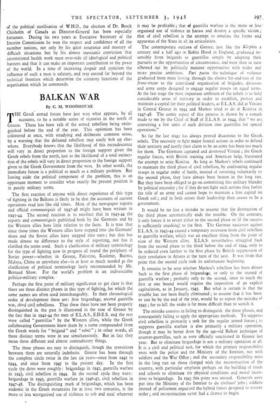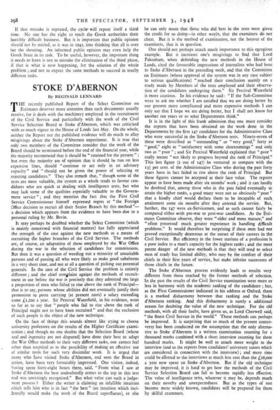BALKAN WAR
By C. M. WOODHOUSE
THE Greek armed forces have just won what appears, by all accounts, to be a notable series of victories in the north of Greece. There has been talk of the armed rebellion being extin- guished before the end of the year. This optimism has been EC-Cantered at once, with steadying and deliberate common sense, by a warning that the defeated rebellion may easily bob up else- where. Everybody knows that the likelihood of this recrudescence will vary in direct proportion to the foreign support given the Greek rebels from the north, just as the likelihood of a total extinct- tion of the rebels will vary in direct proportion to the foreign support given to tM Greek Government from the west. In other words, the immediate future is a political as much as a military problem. But leaving aside the political component of the problem, this is an opportune moment to consider what exactly the present position is in purely military terms.
The first reaction of anyone with direct experience of this type of fighting in the Balkans is likely to be that the accounts of current operations read just like old times. Most of the newspaper reports and official communiqués of 1947-48 might have been written In 1943-44. The second reaction is to recollect that in 1943-44 the reports and communiques published both by the Germans and by the Western allies bore little relation to the facts. It is true that since those times the Western allies have stepped into the Germans' shoes and the Soviet allies have stepped into ours ; but that has made almost no difference to the style of reporting, nor has it clarified the terms used. Such a clarification of military terminology for the type of fighting now in progress all round the periphery of Soviet power—whether in Greece, Palestine, Kashmir, Burma, Malaya, China or anywhere else—is at least as much needed as the clarification of political terminology lately recommended by Mr. Bernard Shaw. For the world's problem is an indissociable politico-military complex. • Perhaps the first point of military significance to get clear is that there are three distinct phases in this type of fighting, for which the same names are often used interchangeably. In their chronological order of development these are: first brigandage, second guerrilla war, third civil rebellions. That these three have not been properly distinguished in the past is illustrated in the case of Greece by the fact that in 1942-44 the men of E.L.A.S., E.D.E.S. and the rest were called " guerrillas " by the Western allies, while the Greek collaborating Government knew them by a name compounded from the Greek words for " brigand " and "rebel" ;• in other words, all three distinct terms were in use simultaneously. But in fact they mean three different and almost contradictory things.
The three phases are easy to distinguish, though the transitions between them are naturally indefinite. Greece has been through the complete circle twice in the last six years—once from 1942 to 1944, and once from 1945 to the present day. In the first cycle the dates were roughly: brigandage in 1942, guerrilla warfare in 1943, civil rebellion in 1944. In the second cycle they were: brigandage in 1945; guerrilla warfare in 1946-47, civil rebellion in 1947-48. The distinguishing mark of brigandage, which has been endemic in the Greek mountains for at least two centuries, is the more or less unorganised use of violence to rob and steal wherever it may be profitable ; that of guerrilla warfare is the more or less ' organised use of violence to harass and destroy a specific victim ; that of civil rebellion is the attempt to emulate the forms and apparatus of the State in all its articulation.
The contemporary outlaws of Greece, just like the Klephts a century and a half ago or Robin Hood in England, graduated in- sensibly from brigands to guerrillas simply by adapting their pursuits to the opportunities of circumstance, and were then in turn elbowed out by politically maturer opportunists with wider and more precise ambitions. Pan i passu the technique of violence graduated from mere looting through the elusive hit-and-run of the franc-tireur to the centralised organisation of brigades, divisions. and army corps designed to engage regular troops on equal terms. At the last stage the most important ambition of the rebels is to hold considerable areas of territory in order to establish, protect and, maintain a capital for their political leaders, as E.L.A.S. did at Viniani in Central Greece in 1944 and Markos tried to do at Konitsa in 1947-48. The comic aspect of this process is shown by a remark made to me by the Chief of Staff of E.L.A.S. in 1944, that "we are, converting a few units of each division into guerrillas for special operations."
So far the last stage has always proved disastrous to the Greek, rebels. The necessity to fight major frontal actions in order to defend. their territory and justify their claim to be an army has been too much. for them. The Germans captured and destroyed Viniani ; the Greek regular forces, with British training and American help, frustrated the attempt to seize Konitsa. As long as Markos's rebels continued to maintain the third phase of civil rebellion, by confronting regular troops in regular order of battle, instead of reverting voluntarily to the second phase, they have always been beaten in the long run. But they have been obliged to go on committing this military blunder, by political necessity ; for if they do not fight such actions they forfeit the title of an army and cannot hope to maintain a free capital on Greek soil ; and in both senses their leadership then ceases to be a, government.
It would be no less a mistake to assume that the destruction of the third phase automatically ends the trouble. On the contrary, it only forces it to revert either to the second phase or (if the success is sufficiently crushing) to the first. The German successes against E.L.A.S. in 1943-44 caused a temporary reversion from civil rebellion to guerrilla warfare, which was an excellent thing from the point of view of the Western allies. E.LA.S. nevertheless struggled back from the second phase to the third before the end of 1944, only to be reduced even further to the first phase by British suppression of their revolution in Athens at the turn of the year. It was from that point that the second cycle took its unfortunate beginning.
It remains to be seen whether Markos's rebellion has been driven back to the first phase of- brigandage, or only to the second of guerrilla warfare ; probably only to the second, since to reach the first at one bound would require the imposition of an explicit capitulation, as in January, 1945. But what is certain is that the trouble has not been finally eliminated ; to assume that it has been. or can be by the end of the year, would be to repeat the mistake oF 1945; for to kill the snake is far more difficult than to scotch it.
The mistake consists in failing to distinguish the three phases, and consequently failing to apply the appropriate methods. To suppress civil rebellion is primarily a task for the regular armed forces ; to suppress guerrilla warfare is also primarily a military operation, though it may be better done by the age-old Balkan technique of counter-guerrillas, such as were officially sanctioned in Greece last year. But to eliminate brigandage is not a military operation at all. It is a civil and political task, for which the primary responsibility rests with the police and the Ministry of the Interior, not with soldiers and the War Office ; and the secondary responsibility rests in the long run on those charged with the reconstruction of the country, with particular emphasis perhaps on the building of roads and schools to eliminate the physical conditions and moral incen- tives to brigandage. In 1945 this point was missed. Generals were put into the Ministry of the Interior to do civilians' jobs ; soldiers instead of policemen organised the hybrid forces designed to restore order ; and reconstruction never had a chance to begin.
If that mistake is repeated, the cycler will 'repeat itself a third time. -No one has the right to teach the Greek authorities their horribly difficult business. But it is important that public opinion should not be misled, as it was in 1945, into thinking that all is over bar thc shouting. An informed public opinion may even help the Greek State in its task. To be useful, however, the important thing it needs to learn is not to mistake the elimination of the third phase, if that is what is now happening, for the solution of the whole problem ; and not to expect the same methods to succeed in totally different tasks.



































 Previous page
Previous page